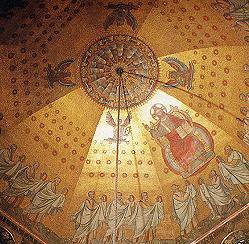Chant Wars
"The emperor Charlemagne (d. 814), acutely aware of the decline of liturgical singing and the many competing chant traditions in his wide-ranging empire, expressed a desire to return to the purity of the ‘original source’, the chant of Rome. The subsequent imperial reform of the liturgy and its music arrived in some regions of the vast Carolingian empire as a kind of ‘cultural revolution’, finding in most places an established local liturgy and singing style with which it had to contend. These confrontations between expert singers (as documented by churchman of the period) and the manner in which this dynamic tension led to the creation of the globalized hybrid repertory we call ‘Gregorian Chant’, form the basis for our program....
The ideal of returning to the ‘original source’ has been voiced by various personalities between the 9th century and our own time, throughout the long history of the liturgical song commonly known as ‘Gregorian chant’; used in reference to opposing views of reality, Charlemagne’s phrase continues to witness to the fact that disputes about that mysterious ideal -- the authenticity of liturgical chant -- have never ceased to flourish. Having been in almost continuous usage in the liturgy, Gregorian plainchant has not always enjoyed the privilege (or should we say the bad luck?) to be considered ‘medieval’ music, and thus didn’t necessarily have to conform to the ever-changing aesthetic vogues of the recently created world of ‘historically informed’ performance. As a living music shared today by active religious communities, secular vocalists interested in medieval performance practice, musicologists and liturgists, plainchant continues to arouse opposing approaches to its interpretation....
The creation of ‘Chant Wars’ was made possible by research grants from the Music Department of Harvard University and the Harvard Divinity School’s Center for the Study of World Religions (Music and the Arts Initiative), which provided for two residencies at Harvard in early 2003...
Source: SEQUENTIA and DIALOGOS -- CHANT WARS (2005) http://www.sequentia.org/
Sample available at http://sonybmgmasterworks.com/artistsites/chantwars/

Dome of Emperor Charlemagne's Cathedral in Aachen, Germany
Photo credit: www.lodging-germany.com
The ideal of returning to the ‘original source’ has been voiced by various personalities between the 9th century and our own time, throughout the long history of the liturgical song commonly known as ‘Gregorian chant’; used in reference to opposing views of reality, Charlemagne’s phrase continues to witness to the fact that disputes about that mysterious ideal -- the authenticity of liturgical chant -- have never ceased to flourish. Having been in almost continuous usage in the liturgy, Gregorian plainchant has not always enjoyed the privilege (or should we say the bad luck?) to be considered ‘medieval’ music, and thus didn’t necessarily have to conform to the ever-changing aesthetic vogues of the recently created world of ‘historically informed’ performance. As a living music shared today by active religious communities, secular vocalists interested in medieval performance practice, musicologists and liturgists, plainchant continues to arouse opposing approaches to its interpretation....
The creation of ‘Chant Wars’ was made possible by research grants from the Music Department of Harvard University and the Harvard Divinity School’s Center for the Study of World Religions (Music and the Arts Initiative), which provided for two residencies at Harvard in early 2003...
Source: SEQUENTIA and DIALOGOS -- CHANT WARS (2005) http://www.sequentia.org/
Sample available at http://sonybmgmasterworks.com/artistsites/chantwars/

Dome of Emperor Charlemagne's Cathedral in Aachen, Germany
Photo credit: www.lodging-germany.com


0 Comments:
Post a Comment
<< Home